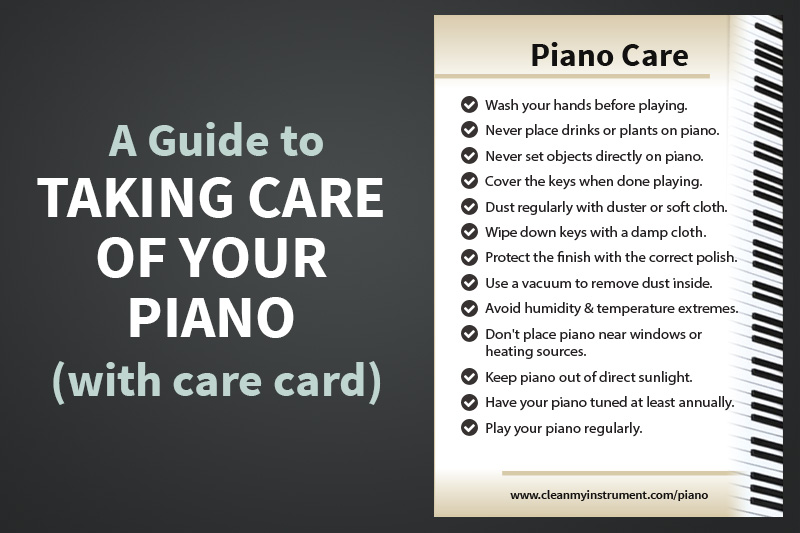Taking proper care of your instrument is “key” to enjoying your piano for many years to come. If you’re a new piano owner or have owned a piano for years and are hoping to pick up a few extra tips, this guide is for you. By taking care of your piano, it will stay more in tune, will require less repairs, and will look better. Also, as a bonus to help you even more, we’ve created a piano care card that you can print off for reference!
How To Take Care Of Your Piano
 Wash your hands before playing.
Wash your hands before playing.- Never place drinks or plants on piano.
- Never set objects directly on piano.
- Cover the keys when done playing.
- Dust regularly with duster or soft cloth.
- Wipe down keys with a damp (not wet) cloth.
- Protect the finish with the correct polish.
- Remove dust inside the piano with a vacuum.
- Avoid humidity and temperature extremes.
- Don’t place piano near windows or heating sources.
- Keep piano out of direct sunlight.
- Have your piano tuned at least annually.
- Play your piano regularly.
We’ll cover each of these care tips in detail below. For quick reference, make sure to download your instrument care card. For piano teachers, save some time by downloading the (coming soon) 4-card-per-page version on Etsy for just $2.
Keeping Your Piano Clean
- Make sure everyone washes their hands before playing. Each time someone plays the piano, they leave behind any dirt and stickiness that may be on their fingers – there’s also the natural oils and skin cells from the hands themselves. If you have multiple pianists, this is compounded with each person so your keys can get dirty quickly.
- Dust regularly with duster or soft cloth. Dusting will protect your finish and make it look better. Use either a feather duster or a soft cloth to lightly brush off the surface. The cloth can be cotton or microfiber as long as it’s soft and won’t be abrasive to the finish. If using a cloth, dust in straight lines rather than in a circular pattern.
- Wipe down keys with a damp (not wet) cloth. As summarized from our piano cleaning guide, you’ll want to dampen your cloth with soapy water and then wipe down your keys. Using 2 different cloths, you’ll wipe down the black keys first and then the white keys. Make sure no water drips down into your piano.
- Protect the finish with the correct polish. The finish is the protective coat that provides the elegant sheen and color but more importantly, protects the wood from moisture damage. You should stay away from common furniture polishes and use a polish that is specifically engineered for pianos. We recommend using any of the Cory brand products depending on what kind of finish you have: gloss, satin, or unfinished. Wipe in the same direction as the wood grain and wipe off any excess with a cloth. For a more in-depth discussion, read our article on cleaning a satin finish piano. Also, keep disinfecting wipes away.
- Remove dust inside the piano with a vacuum. First off, be extra careful when cleaning the interior of your piano since there’s a lot of parts that can be easily damaged, and you don’t want to be calling a piano technician. However, as the dust builds up on your strings, over time, that dust can dampen the overall sound your piano produces. You can use your vacuum with an extension if you have a long hose and can reach but make sure not to set the vacuum on your piano ever. Also, watch that your extension hose doesn’t put too much pressure on your piano. A mini vacuum may be a better choice as it’ll be easier to maneuver. You can also use a pin cleaning brush to dislodge the dust before vacuuming.
Protecting Your Piano
 Never place drinks or plants on piano. Anything that can cause damage or stain your finish should not be placed on your piano. A drink can easily be spilled and a potted plant can be overturned, especially if you have cats. Plant pots can also scratch the finish. Keep any liquid away from your piano, at least 3 feet away – it’s not worth it!
Never place drinks or plants on piano. Anything that can cause damage or stain your finish should not be placed on your piano. A drink can easily be spilled and a potted plant can be overturned, especially if you have cats. Plant pots can also scratch the finish. Keep any liquid away from your piano, at least 3 feet away – it’s not worth it!- Never set objects directly on piano. Your piano is not a shelf but if you do want to place objects on your piano, place a doily or other soft fabric under the object to protect your piano’s finish. Avoid placing heavier items on your piano since the weight can dampen the tone of your music.
- Cover the keys when done playing. Covering the keys when not in use will protect your keys from harmful dust buildup and exposure to other things you don’t want on your keys, like pet hair or children coloring on them with their crayons. If your piano has a built-in cover (fallboard), put it down when you’re done playing. Otherwise, you can find a good piano key cover on Amazon or your local music store. You can also buy a drop cloth but I recommend against one since it’ll discourage you from playing your piano. You piano should always be ready to play.
- Avoid humidity and temperature extremes. Fluctuations in the temperature can cause your piano to expand or contract, causing your piano to go out of tune faster. Try to keep your piano a constant room temperature (around 70 degrees Fahrenheit). Too much humidity will cause your soundboard to swell and increase the pitch of the piano. Low humidity can cause your piano to go flat, or even cracks in the soundboard. The ideal humidity for a piano is around 42%. You can use a hygrometer to test the humidity, a dehumidifier to lower it, and a humidifier to raise the moisture level. We also wrote an article on how humidity affects pianos if you’d like to learn more.
- Don’t place piano near windows or heating sources. As discussed, your piano is sensitive to hot and cold so you’ll want to keep it away from space heaters, fireplaces, and don’t place over a heat vent. Similarly, don’t place your piano in front of an air conditioning unit or directly in front of windows. The A/C and windows can introduce extra humidity as well.
- Keep piano out of direct sunlight. Over time, direct sunlight can cause your finish to fade and can even crack, by drying out the wood. They don’t make sunblock for pianos, so keep your piano out of the sun!
Piano Maintenance
- Have your piano tuned at least once a year. Most piano technicians will tell you to tune your piano twice a year since the soundboard will expand and contract with the seasons. However, piano tuning typically costs $100-$150 depending on various factors so many piano owners will opt for an annual visit from their friendly piano tuner instead. Besides tuning your piano, a technician will also inspect your piano, thoroughly clean your piano inside and out, and provide repairs or other services. If you can’t find a registered piano technician then ask friends or family for references – it’s important to find a professional piano technician that you can trust.
- Regulate your piano as needed. Over time, the parts in your piano will wear and the keys won’t play predictability, which may cause keys to require different pressure. Regulating your piano will fix this and requires making minor repairs and adjustments throughout the piano so that all parts operate uniformly. Only trust an experienced piano technician to regulate your piano.
- Voice your piano as needed. Beyond regular tuning, you may want to change the overall sound of your piano to produce an overall warmer or brighter tone by all keys. This is done through adjusting the felt on each hammer in your piano. Hire an experienced piano technician to make the required adjustments.
- Play your piano regularly. Playing your piano every week is good for your piano and good for you! By playing at least once a week, you’ll keep all the moving parts working and identify any issues before they become problems.
A Couple of Other Tips
Here’s a few more tips:
- Unless your basement is humidity and temperature regulated, don’t place your piano in the basement.
- Try to keep your pets away from your piano, or at least minimize exposure to them. Their hair can get in things and they may damage the piano with their claws.
- Playing an out of tune piano will increase the wear and tear on your piano, so if it sounds out of tune, definitely call in a pro!
Final Thoughts
By following these tips and maintaining proper care of your piano, you’ll keep your piano in tune longer, and in prime working condition, cleaner, and looking great. You’ll be protecting your investment and making sure your piano is ready for a quick play whenever you’re in the mood for Beethoven or Chopin or something more contemporary.
Make sure to check out our in-depth article on cleaning and maintaining your piano – it’s well worth the read. We have lots of other articles on pianos as well, along with the recommended gear and supplies.
Happy playing!


